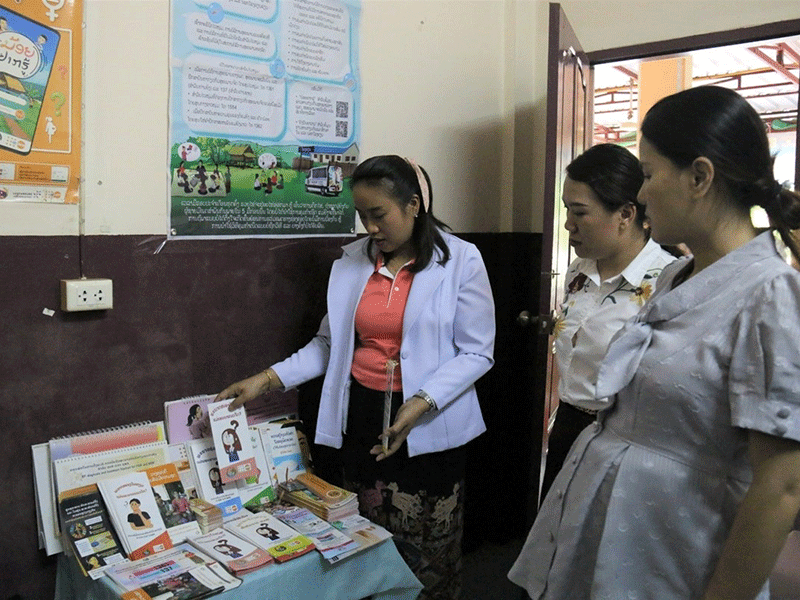 |
Members of the Lao media interview pregnant women from remote areas. |
How women from Vientiane’s remote areas are finding their way to safer births
The sky was beginning to lighten over the hills of Vientiane province as a small group of pregnant women prepared for its journey.
Wrapped in scarves against the morning chill, they walked the winding road out of their village, heading toward the provincial hospital, hours away, but essential for the future growing inside them, a pregnant woman from a remote area said.
For these women, the trip wasn’t just a physical one. It was a quiet act of courage and trust – a sign of changing times in communities where childbirth once happened almost entirely at home.
In a country where the government has set a goal of 89 percent of pregnant women delivering their babies in health facilities, Vientiane province still lags behind. Just 73 percent of women give birth in clinics or hospitals, and that shortfall weighs heavily on local health officials.
“We have to ask ourselves why?” the Deputy Director of Vientiane province’s Health Department, Dr Viengmany Keomahavong, said in an interview with members of the Lao media who visited the province to learn about a reproductive health programme supported by the UNFPA and development partners.
Dr Viengmany’s voice was calm, but her concern was visible: “Some women still don’t trust health staff. Others simply live too far away, or the clinics are too crowded. And then there are deep-rooted traditional beliefs passed from mother to daughter that say home is where a baby should be born.”
But things are beginning to change, and for Dr Viengmany and her colleagues, even small shifts in attitude are signs of progress. “We’ve already seen a decline in maternal and newborn mortality rates,” she said. “This tells us our efforts are making a difference.”
At the provincial hospital, a quiet revolution is underway. Every week, the maternal and child health team offers not just check-ups, but full sessions in what it means to become a mother – nutritionally, physically, emotionally and financially.
“We want them to feel confident,” said Dr Bounsanith Thanongsangchanh, the head of the maternal and child health unit under the provincial hospital. “Not just about their pregnancies, but about raising their children and about understanding their rights. About knowing their bodies.”
During these sessions, women learn how to prepare for birth, how to spot danger signs, and how to plan for the days and weeks after delivery. They ask questions. They laugh. Sometimes they cry. But most importantly, they no longer feel alone.
Back in the villages, the support continues. Through close collaboration between the Vientiane provincial women’s union, the Lao women’s union central committee and the provincial health teams, the women receive home visits and postnatal care. These programmes make sure the connection doesn’t end when a mother leaves the hospital.
“We’ve brought vital reproductive health knowledge right to their doorsteps,” said Ms Somphone Southammavong, the Vice President of the women’s union. “It’s changing how families see women’s health, how they value it.”
But while health education and outreach are growing, the professionals needed to deliver this care are in short supply.
Ms Pheakham Inthavong, a teacher at the Vientiane public health school, where new healthcare workers are trained, said interest in midwifery is dwindling. Last year, not a single student enrolled in the programme.
“It’s alarming,” she said. “A few years ago, we had more than 30 students per year. Now, we’re seeing zero. If this continues, who will care for mothers in the future?”
The deputy head of the youth reproductive health counselling centre in Don Kuat village of Viengkham district in Vientiane province, Dr Manivone Phafong, said the work is starting even earlier, as young people, some not even married, are getting information that could one day save their lives.
“We talk about pre-marital and pre-pregnancy health,” she explained. “It’s about helping young people understand their options, avoid risks and plan for healthy families.”
She hoped that with additional funding, the programme can train more peer educators among young people who speak the same language, literally and figuratively, as their communities.
They can help spread awareness of family planning and sexually transmitted infections, reaching places doctors and nurses can’t always go.
In Vientiane province, progress doesn’t always come in the form of a grand building or a shiny machine. Sometimes, it looks like a group of women walking together in the early morning, taking slow but determined steps toward something safer, stronger and more hopeful.
Because in the end, what matters most isn’t just medical care. It’s the quiet, powerful assurance that no woman has to go through pregnancy or childbirth alone.
by Phetphoxay Sengpaseuth
(Latest Update July 17, 2025)
|


